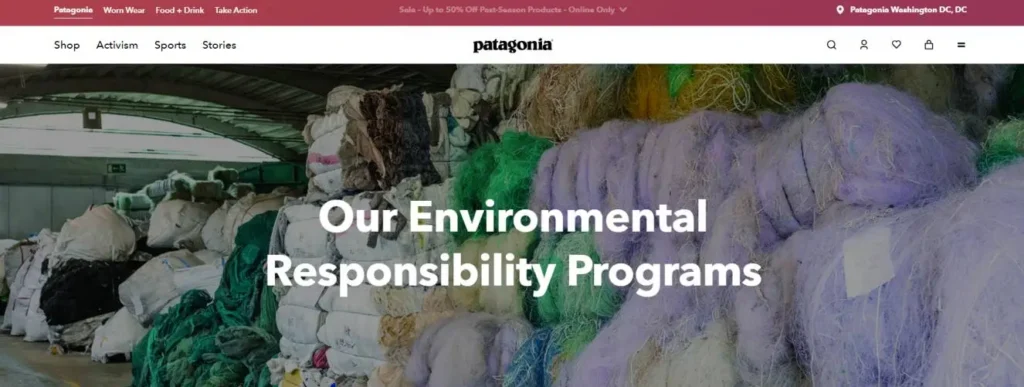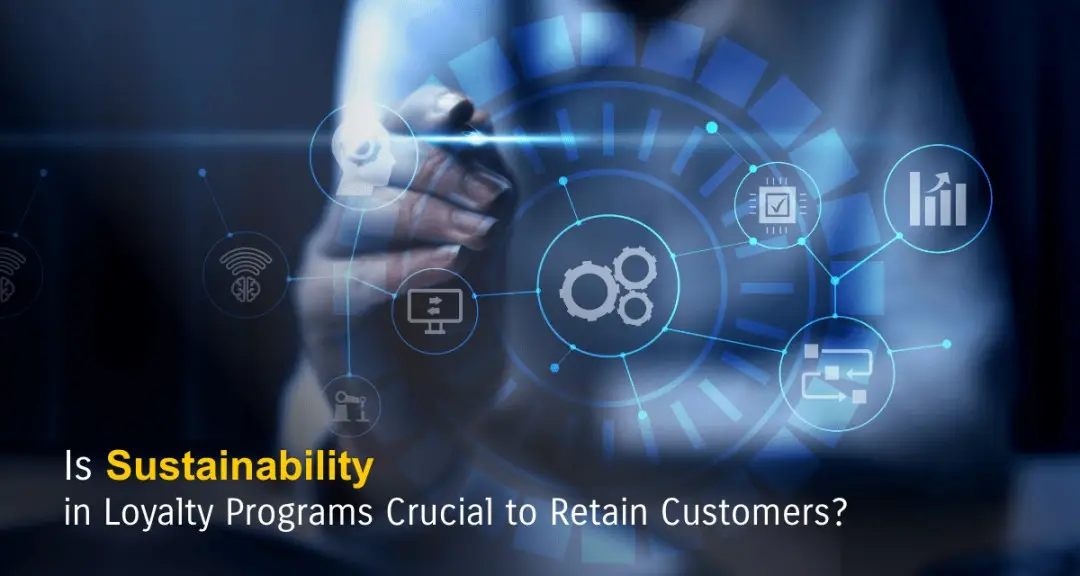Along with the rapid digital revolution, the awareness of customers towards the environment has substantially increased. Gartner predicts that sustainability’s role in business will accelerate in the coming years. Customers’ growing awareness of green earth is a sign of behavioral evolution for marketers.
More than 63% of respondents agreed that sustainability is crucial for staying loyal to any brand. With access to information about everything, customers want brands to commit to shared values in achieving sustainable goals. 2 out of 3 customers are belief-driven buyers, making sustainability a top priority for brands.
What is a Sustainable Loyalty Program?
A sustainable loyalty program rewards customers for making sustainable choices. This green program is designed to promote environmentally friendly practices among customers by incentivizing green practices. It aligns a brand’s values with ecological stewardship, encouraging customers to engage in behaviors that reduce environmental impact. Through such programs, businesses incentivize eco-conscious purchasing and usage habits, fostering a loyalty strategy that contributes positively to the planet.
A Shift Towards Purpose-Driven Loyalty Programs
66% of customers are ready to pay extra for brands aligned with sustainable goals. For example, Madewell offers a $20 discount for its loyalty members when they return old jeans to their partner stores. Brands stepping up with rewards for sustainable goals are reaping benefits.
To maintain and increase customer loyalty, brands must acknowledge the role of a holistic approach toward loyalty programs. Customers chase sustainability, but brands should make it easy for members to give back to the environment and society. Recent years have embraced empathy among customers which in turn has created a shift towards purpose-driven loyalty programs.
Carbon dioxide emission is a top concern for customers around the globe. As a result, brands with carbon offsetting programs are attracting more customers. For example, Shell Go+ has a CO2 offsetting program where loyalty members can join and continue fuel shopping. Brand purchases carbon credits matching the amount of fuel bought by program members.
How to Create a Sustainable Loyalty Program?
Creating a green loyalty program involves integrating practices that not only engage customers but also promote environmental stewardship. Here are five key strategies:
1. Reward Eco-Friendly Behaviors
Increase the incentive for sustainable and eco-friendly actions by offering unique rewards that resonate with eco-conscious customers. For example, provide bonus points for every purchase made with reusable containers or for every product returned for recycling. This not only encourages repeat eco-friendly behaviors but also aligns your brand with sustainability.
2. Partner with Sustainable Brands
Create a strategic partnership with companies that prioritize eco-friendly practices. By offering products or services from these partners as part of your loyalty rewards, you’re not only broadening your product range but also reinforcing your commitment to the environment. This loyalty strategy also provides an opportunity for cross-promotion, potentially attracting a wider eco-conscious audience.
3. Educate Your Customers
Use your loyalty program as a platform for raising awareness about environmental issues and the impact of sustainable and green living. Share engaging content, such as blog posts or videos, that informs customers about the benefits of sustainable practices and how they can contribute. Education is key to changing consumer behavior, making this a vital component of a sustainable loyalty program.
4. Incorporate Sustainability into Rewards
Ensure that the rewards offered through your loyalty program are environmentally friendly. This could mean sourcing products made from recycled materials or offering digital rewards instead of physical goods to reduce carbon footprint. Another approach could be to offer experiences, like workshops on sustainability, as rewards.
5. Measure and Share Impact
Quantify the environmental benefits of participating in your loyalty program and share these successes with your customers. This could include metrics like the amount of plastic saved through reusable packaging or the reduction in carbon footprint due to eco-friendly product choices. Sharing these achievements makes customers feel part of a larger mission, enhancing loyalty and satisfaction.
Implementing these points can help create a loyalty program that aligns with the values of today’s eco-conscious consumers, creating loyalty through shared goals for a more sustainable future.
Quick Strategies for Implementing Sustainable Behavior
- Reward customers with coupons for sustainable-first brands.
- Partner with charitable & environmentally friendly organizations to allow members to donate their points to desired organizations.
- Replace physical loyalty cards with digital cards.
- Offer them loyalty program points for returning used products using reusable shopping bags.
- Give them discounts when they donate their points for carbon offsetting initiatives.
Sustainability is not a brand constraint but a catalyst for brand awareness and growth. Integrating sustainability in loyalty software demands a modern tech stack that is future-ready. Successful brands have seamlessly advanced in loyalty platform infrastructure to make it easy for customers.
Sustainable Loyalty Programs Examples
1. Patagonia – 100% Commitment to the Environment.

The well-known brand has environmental sustainability at the core of its business. It’s a loyalty program – Patagonia Pro is a premium program that has pledged 1% of its sales towards the restoration of forests and the preservation of the natural environment. The brand has acted strongly on its promise of safe practices in manufacturing products and enabling the environment to improve simultaneously.
2. IKEA – Inspiring Sustainable Actions
IKEA’s loyalty program members get exclusive discounts for shopping sustainable products across dining, textile, furniture, and other categories. The brand couples sustainability firmly with a loyalty program. It runs contests for its loyalty platform members aimed at inspiring sustainability initiatives.
With robust technology infrastructure at the backend, the brand knows customer expectations and offers customized rewards. Also, integrating gamification in rewards for sustainable rewards ensures higher engagement rates. Furthermore, with more than 180 million loyalty program members, the holistic loyalty approach ensures consistent growth of the loyalty program.
3. Costa Coffee – Sustainability Comes First.
Following the pandemic, the brand revamped its loyalty program leaning towards sustainability. Even as a business, producing reusable cups and partnering with charitable organizations has proven the brand’s affinity towards sustainability.
With its loyalty program, it encourages people to take sustainable actions. Members can get a free coffee cup when they use 4 reusable cups, whereas regular cups need to buy 8. The loyalty program is accessible through a mobile app with educative content about the sustainability initiatives of Costa Coffee.
Sustainability in action = Sustainable revenue growth
The need to go sustainable is for more than just meeting customer expectations. The brands mentioned above have increased their sales significantly after deploying sustainability-driven campaigns. Patagonia, for example, experienced a 30% growth in sales when they launched their “Don’t buy this jacket” campaign. They focused on reduce, reuse, and recycle messaging.
Similarly, more than 16% of brands are introducing rewards for sustainability in their loyalty programs.
Benefits of Sustainable Loyalty Programs

1. Increase in Store Visits:
With the promotion of returning used products, packets, and clothes, retail brands are experiencing a surge in in-store visits. It allows retail brands to engage customers easily and boost their revenue.
2. Increase in Brand Affinity:
Nearly 75% of millennials prefer connecting with brands with sustainability as their core messaging. Growing global environmental awareness highlights brands that align with a climate-friendly vision. Such brands are celebrated and earn brand recognition without investment. Additionally, it boosts the brand’s presence in social communities opening the gate for referrals and more loyal customers.
3. Build Loyalty Partnerships:
To achieve sustainable goals, brands partner with charitable organizations and carbon-offsetting companies that expand the potential member base. Partnerships allow members to use their points and give back to the community in multiple ways.
4. Improved Brand Image:
A brand supporting green actions creates a positive brand image by demonstrating a commitment to environmental responsibility.
5. Attract Eco-conscious Consumers:
This initiative can appeal to a growing segment of the market that prefers to support environmentally friendly businesses.
6. Encourages Repeat Business:
Fosters customer loyalty by aligning rewards with the values of sustainability-minded consumers.
7. Differentiates from Competitors:
Offers a unique selling proposition in a crowded market by focusing on eco-friendly practices.
8. Promotes Customer Engagement:
Engages customers through sustainable practices, making them feel part of a larger mission.
9. Increases Customer Satisfaction:
Increase customer satisfaction by offering meaningful rewards that contribute to a cause.
10. Drives Sustainable Actions:
Motivates customers to adopt more sustainable habits, contributing to wider environmental goals.
Shifting to a sustainable perspective demands steadfast commitment from brands. Brands need a holistic approach to include sustainable practices in their loyalty programs. At the same time, through consistent marketing and communication, marketers need to put their brand as the first choice.
Conclusion
Sustainable loyalty programs represent an important shift in aligning business strategies with customer values, highlighting the critical role of eco-friendly practices in customer retention. By embracing sustainability, businesses not only meet the growing customer demand for responsible practices but also build deeper brand loyalty and engagement. This strategic alignment not only benefits the environment but also ensures long-term business success and customer satisfaction.
For an in-depth understanding, exploring examples and strategies within this context can offer valuable insights into the implementation of green loyalty programs. Furthermore, a data-driven rewards program has allowed brands like IKEA to customize sustainable offerings, resulting in better customer engagement. It’s time to be ready for the future. It’s time to adopt a holistic approach.
Related Questions
1. What are sustainable loyalty programs?
These programs incentivize customers to take actions that benefit the environment, aligning with a company’s green initiatives.
2. Why should businesses implement these programs?
They align with consumer expectations for environmental responsibility, enhancing brand loyalty, and supporting sustainability goals.
3. How can businesses create a green loyalty program?
By selecting software that integrates sustainability actions with rewards, like discounts for recycling or bonuses for eco-friendly purchases.
4. Can digital solutions enhance program sustainability?
Yes, digital solutions like loyalty apps reduce waste and improve customer engagement through convenience.
5. What are some successful examples?
Examples include airlines rewarding sustainable travel, clothing brands offering discounts for recycling, and outdoor retailers supporting environmental nonprofits through sales.
6. How do these programs impact consumer behavior?
They encourage customers to engage in eco-friendly behaviors by making sustainability personally rewarding.
7. What challenges might businesses face and how can they overcome them?
Businesses may struggle with changing consumer habits and the complexity of creating sustainable alternatives. Overcoming these challenges involves educating customers and leveraging digital tools for easier participation in sustainability efforts.


